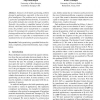Free Online Productivity Tools
i2Speak
i2Symbol
i2OCR
iTex2Img
iWeb2Print
iWeb2Shot
i2Type
iPdf2Split
iPdf2Merge
i2Bopomofo
i2Arabic
i2Style
i2Image
i2PDF
iLatex2Rtf
Sci2ools
FCS
2007
2007
The Complexity of Futile Questioning
Instances of the futile questioning problem abound in applications, especially, in the area of artificial intelligence. The problem can be represented by a particular quantified Boolean formula. A variation of the problem includes also costs for the logic variables. Typically, the problem is simplified instead of solved directly, which may lead to inaccurate results. Alternatively, the problem can be transformed to a standard format. We investigate the complexity of the futile questioning problem and two subclasses. Based on the complexity result, we argue that a transformation to the standard format is not suitable for practical purposes.
Computer Science | FCS 2007 | Futile Questioning Problem | Quantified Boolean Formula | Standard Format |
Related Content
| Added | 29 Oct 2010 |
| Updated | 29 Oct 2010 |
| Type | Conference |
| Year | 2007 |
| Where | FCS |
| Authors | Anja Remshagen, Klaus Truemper |
Comments (0)

